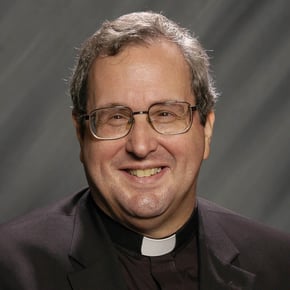"Dear Father Spitzer, So, I’ve read a lot of your arguments, and it sounds to me like you’re saying that there is cosmological evidence for a creator.
"I can understand that. What I don’t understand is how you make the leap from that to Christianity?
"Lori"

Dear Lori,
I was asked this very question on a retreat by a graduate student in chemistry when I was teaching at Georgetown University. I answered the question by means of six other questions which bridge the “leap” between the transcendent creator and Jesus Christ (Emmanuel – God with us). The answer is evidently concerned with love.
Though one may pick up implications of love from the way in which the universe is created, evidence from physics really does not concern the unconditional love of God. This came to light through revelation – a revelation given to us by Jesus.
Yet how do we ascertain that Jesus is “God With Us?”
If you respond to the questions below in a way similar to the responses given here, the “leap” may be quite intelligible.
Six Questions Toward Emmanuel
When I was teaching at Georgetown University, I was privileged to direct a physics and philosophy student on an Ignatian retreat. He was exceptionally bright and good-willed, and had the capacity to express what was on his mind in a very straightforward way.
At the beginning of our first conference he said,
“Could I ask you something very elementary which has been bothering me for several years? I don’t have any real problem with the idea of a Creator, because I believe that finitude is intrinsic to time and the origin of the universe will ultimately have to have a cause beyond a universal singularity.
"God is not a question for me. But it’s this Jesus thing. I’m not sure I see the need for Jesus and I’m not sure I really get it. Can’t we just stick with a ‘Creator outside of space-time asymmetry’?”
I thought about it for a couple of minutes and said to him,
“The ‘Jesus thing’ is about the unconditional Love of God. It is about God wanting to be with us in a perfect act of empathy; about God wanting to save us unconditionally and to bring us to His own life of unconditional Love.
"A Creator alone, indeed, even a Creator with infinite power, could be tantamount to Aristotle’s God. Once he has fulfilled His purpose of ultimate, efficient, and final causation, He is detached from the affairs of rather base and uninteresting human beings.
"The God of Jesus Christ is about the desire to be intimately involved in the affairs of human beings made in His image and destined for His eternity – and that makes all the difference.”
He said in reply, “This all seems a bit too good to be true. I would like the Creator to be the God of Jesus Christ, but do you have any evidence that this is not just wishful thinking – evidence showing that this is really the way God is? Is there any reason why we would think that God is loving instead of indifferent?”
I responded by noting that it would be better for him to answer six questions rather than have me give an extended discourse, because the six questions could reveal not only what was in his fine mind, but more importantly, what was in his heart – what he thought about love, life’s purpose, others, and His highest imaginable state of existence.
If he answered these six questions (from his heart) in a manner commensurate with “the logic of love,” then the unconditional Love and divinity of Christ (i.e., Jesus being Emmanuel – God with us) would be self-evident.
I give you, the reader, these six questions and some points to guide your reflection, so that you might be able to see more clearly the logic of love and its consequences for an “unrestricted Creator outside of space-time asymmetry” (God).
1. What is the most positive and creative power or capacity within me?
At first glance, one might want to respond that this power is intellect, or artistic creativity, but further reflection may show that the capacity to apprehend truth or knowledge, or to create beauty, in and of itself, is not necessarily positive. Knowledge and beauty can be misused, and therefore be negative, destructive, manipulative, inauthentic, and thus undermine both the individual and common good.
There is but one human power that contains its own end of “positivity” within itself, one power that is directed toward the positive of itself, and therefore one power that directs intellect and artistic creativity to its proper, positive end. As may by now be evident, that power is love (agape – see Section I above). Love’s capacity for empathy, its ability to enter into a unity with others leading to a natural “giving of self,” forms the fabric of the common good and the human community, and so seeks as its end the good of both individuals and that community.
As implied above (Section I), love by its very nature unifies, seeks the positive, orders things to their proper end, finds a harmony amidst diversity, and gives of itself in order to initiate and actualize this unifying purpose. This implies that love is naturally oriented toward perfect positivity and perfect fulfillment.
Furthermore, love would seem to be the one virtue that can be an end in itself. Other virtues do not necessarily culminate in a unity with others whereby doing the good for the other is just as easy if not easier than doing the good for oneself. Thus, courage, left to itself, might be mere bravado or might lead to the persecution of the weak.
Self-discipline, left to itself, might lead to a disdain for the weak or a sense of self-sufficiency which is antithetical to empathy. Even humility can be overbearing and disdainful if it is not done out of love.
Even though these virtues are necessary means for the actualization of love (i.e., authentic love cannot exist without courage, self-discipline, and humility), they cannot be ends in themselves, for they can be the instruments of unlove when they are not guided by the intrinsic goodness of love. Love seems to be the only virtue that can be an end in itself and therefore can stand by itself.
Now, if you, the reader, affirm the existence of this power within yourself and further affirm that it is the guiding light of both intellect and creativity, that its successful operation is the only way in which all your other powers can be guided to a positive end, that it is therefore the only way of guaranteeing positivity for both yourself and others, and that it therefore holds out the promise of authentic fulfillment, purpose in life, and happiness, then you will have acknowledged love to be the highest of all powers. You will then want to proceed to the next question.
2. If love is the one power that seeks the positive in itself, and we are made to find our purpose in life through love, could God (perfect Being), who created us with this loving nature, be devoid of love?
If the Creator were devoid of love, why would that Creator create human beings not only with the capacity for love, but to be fulfilled only when they are loving?
If the Creator is devoid of love, why make love the actualization of all human powers and desires, and therefore of human nature? If the Creator is not loving, then the creation of “beings meant for love” seems absurd. However, if the Creator is love, then creating a loving creature (i.e., sharing His loving nature) would seem to be both intrinsically and extrinsically consistent with what (or perhaps better, “who”) He is.
Could the Creator be any less loving than the “loving nature” He has created? Furthermore, if a Creator were perfect Being, wouldn’t that perfect Being also be capable of the one power and virtue which can be an end in itself, that is, Love?
If you, the reader, can reasonably affirm the love of the Creator from the above, then you may want to proceed to the third question.
3. Is my desire to love and to be loved conditional or unconditional?
It may do well to pause for a moment here and give some background about our desire for love which has occupied the writings of many philosophers since the time of Plato.
We appear to have a desire for perfect and unconditional Love. Not only do we have the power to love (i.e., the power to be naturally connected to another human being in profound empathy, care, self-gift, concern, and acceptance), we have a “sense” of what this profound interpersonal connection would be like if it were perfect. This sense of perfect love has the positive effect of inciting us to pursue ever more perfect forms of love.
However, it has the drawback of inciting us to expect ever more perfect love from other human beings. This generally leads to frustrated expectations of others and consequently to a decline of relationships that can never grow fast enough to match this expectation of perfect and unconditional Love.
The evidence of this desire for perfect and unconditional Love manifests itself in our frustrated expectations within relationships. Have you ever had this experience – where you thought a relationship (or friendship) with another was going quite well until little imperfections began to manifest themselves? In situations like these, there might be slight irritation, but one has hopes that the ideal will soon be recaptured.
But as the fallibility of the beloved begins to be more acutely manifest (the other is not perfectly humble, gentle, kind, forgiving, self-giving, and concerned with me) the irritation becomes frustration, which, in turn, becomes dashed expectation: “I can’t believe I thought she was really the One.” Of course, she wasn’t the One, because she is not perfect and unconditioned.
This gives rise to the question, “Why do we all too frequently expect our beloveds to be perfect and expect ourselves to be perfect to our beloveds if we did not have a desire for perfect and unconditional Love in the first place?”
The reader must now apply this question to him or herself. If you did not have a desire for perfect and unconditional Love, why would you be so dissatisfied with imperfect and conditioned manifestations of love in others (even from the time of childhood)?
If you sense within yourself an incapacity to be ultimately satisfied by any form of conditioned or finite love, then you will have also affirmed within yourself the intrinsic desire for unconditional Love, which leads to the next question.
4. If my desire for love can only be ultimately satisfied by unconditional Love, then could the Creator of this desire be anything less than Unconditional Love?
A simple response to this question might run as follows: if we assume that the Creator does not intend to frustrate this desire for unconditional Love within all of us, it would seem that His creation of the desire would imply an intention to fulfill it, which would, in turn, imply the very presence of this quality within Him.
This would mean that the Creator of the desire for unconditional Love is (as the only possible fulfillment of that desire) Himself Unconditional Love.
The reader here is only affirming the inconsistency of a “Creator incapable of unconditional Love” creating a being with the desire for perfect and unconditional Love. This is sufficient for affirming the presence of unconditional Love in the Creator.
A more complete explanation might begin with the origin of the desire for perfect and unconditional Love. The awareness of unconditional Love (which arouses the desire for unconditional Love) seems to be beyond any specifically known or concretely experienced love, for it seems to cause dissatisfaction with every conditioned love we have known or experienced. How can we have an awareness of love that we have neither known nor experienced?
How can we even extrapolate to it if we do not know where we are going? The inability of philosophers to give a purely naturalistic answer to these questions has led them to associate the “tacit awareness of unconditional Love” with the “felt presence of Unconditional Love Itself.” Unconditional Love Itself would therefore seem to be the cause of our awareness of It and also our desire for It. Inasmuch as Unconditional Love Itself transcends all conditioned (and human) manifestations of love, it might fairly be associated with the Creator.
The Creator would then be associated with our human awareness of and desire for unconditional Love. Therefore, it seems that the Creator would have to be at least capable of unconditional Love.
5. If the Creator is Unconditional Love, would He want to enter into a relationship with us of intense empathy, that is, would He want to be Emmanuel (“God with us”)?
If one did not attribute unconditional Love to God, then the idea of God wanting to be with us, or God being with us, would be preposterous. A God of stoic indifference would not want to bother with creatures, let alone actually be among them and enter into empathetic relationship with them. However, in the logic of love, or rather, in the logic of unconditional Love, all this changes.
If we attribute the various parts of the definition of agape (given above in Section I) to an unconditionally loving Creator, we might obtain the following result: God (as Unconditional Agape) would be unconditional empathy and care for others (even to the point of self-sacrificial care).
As such, God would expect neither repayment for this care, nor any of the affective benefits of the other three kinds of love.
Hence, God would not need the affection of storge in order to love us, though He would have unconditional affection for us; He would not need the mutual commitment and caring of philia, though He would be unconditionally committed to us in friendship; and He would not have need of our romantic feelings, even though He would grace such feelings in the human endeavor toward exclusive love. God would seek unconditionally to protect, defend, maintain, and enhance the intrinsic dignity, worth, lovability, unique goodness, transcendental mystery, and intrinsic eternity of every one of us.
Recall that love is empathizing with the other and entering into a unity with that other whereby doing the good for the other is just as easy, if not easier, than doing the good for oneself. This kind of love has the non-egocentricity, humility, self-gift, deep affection, and care which would make infinite power into infinite gentleness, and would incite an infinitely powerful Being to enter into a restrictive condition to empathize more fully with His beloveds.
In this logic, “Emmanuel” would be typical of an unconditionally loving God. This would characterize the way that Unconditional Love would act – not being egocentrically conscious of the infinite distance between Creator and creature, but rather being infinitely desirous of bridging this gap in a perfect unity of perfect empathy and perfect care. It would be just like the unconditionally loving God to be “God with us.”
The following consideration might help to clarify this. If God is truly Unconditional Love, then it would not be unreasonable to suspect that He would be unconditional empathy; and if He were unconditional empathy, it would not be unreasonable to suspect that He would want to enter into an empathetic relationship with us “face-to-face” (“peer-to-peer”) where the Lover and beloved would have a parallel access to the uniquely good and lovable personhood and mystery of the other (through empathy).
A truly unconditionally loving Being would want to give complete empathetic access to His heart and interior life in a way which was proportionate to the receiving apparatus of the weaker (creaturely) being. It would seem reasonable (according to the reasonings of the heart), then, that an unconditionally loving Creator would want to be Emmanuel in order to give us complete empathetic access to that unconditional Love through voice, face, touch, action, concrete relationship, and in every other way that love, care, affection, home, and felt response can be concretely manifest and appropriated by us.
If God really is Unconditional Love, then we might be presumptuous enough to expect that He might be Emmanuel; and if Emmanuel, then concretely manifest in history. If this resonates with the reader’s thoughts and feelings, you will want to proceed to the next question.
6. If it would be typical of the unconditionally loving God to want to be fully with us, then is Jesus the One?
As reasonable and responsible as the answers to the above questions might be, they can be considerably strengthened through historical corroboration, that is, through experienceable data which concretizes the reasoning given immediately above. What kind of experienceable data could accomplish this corroboration?
Data which at once manifests (1) God in our midst (Emmanuel) and (2) God as Unconditional Love. It so happens that a remarkably powerful experienceable event did at once manifest and synthesize these two corroborating data, and showed the above reasoning about the unconditional Love of God to be both reasonable and experienceable, and to be mutually corroboratable through concrete experience and the logic of love. This remarkable experienceable event is Jesus Christ.
So can this incredibly good news, this historical corroboration of our reasoning, this complete access to the heart of God be brought into focus so that it can be seen clearly to be at once the truth about God and our destiny?
I believe it can, because the life of Jesus and the Church He initiated is filled with clues that synergistically connect the mind to the heart and the heart to the mind.
Lori, I hope this is helpful. There are many other people who have the same question.
Sincerely,
Father Spitzer

